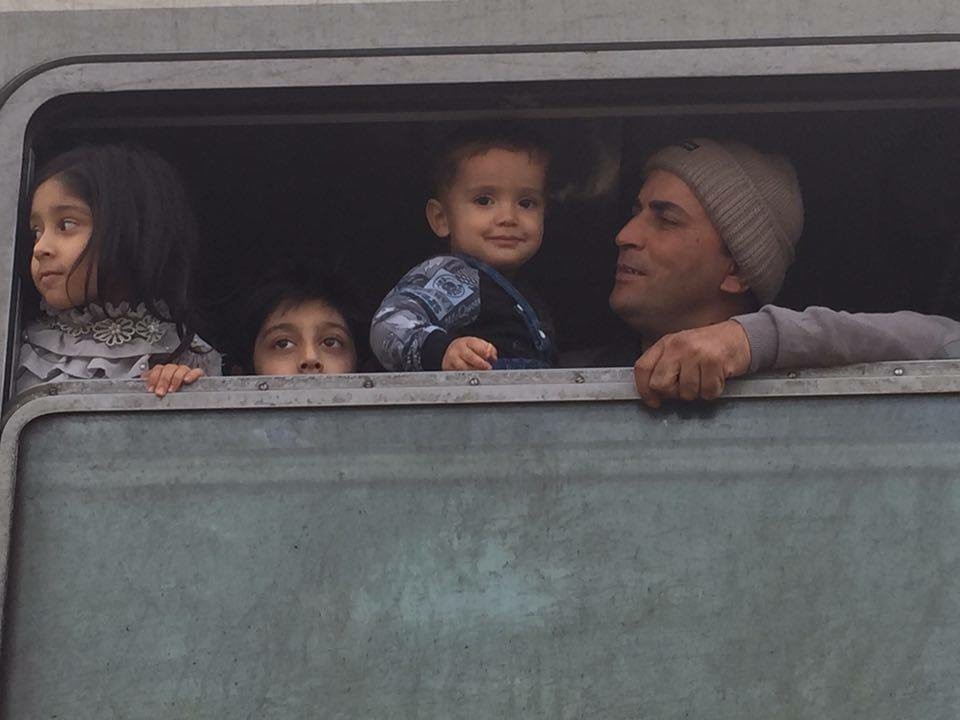
Refugees from Syria in November 2015. Giovanna Negretti / AFSC
An end to violence in Syria is possible, but will take international community commitment.
An Arabic proverb has been on my mind in recent days. Roughly translated, it goes, “They killed him then walked in his funeral mourning his death.” That, to me, is Syria.
The heart-wrenching reports from civilians who are trapped in Aleppo demonstrate the difficulties that the international community faces in bringing an end to the crisis in Syria.
Change to the horrific state of affairs in Syria is possible, but it will require the international community to directly address the proxy war and put the full force of its efforts behind solutions to conflict that do not involve violence, including negotiations and the defense of human rights.
A protracted conflict by all definitions, there is no end in sight to the violence and no change in any of the involved parties’ actions and responses. On the contrary, five years after the conflict started, it has only escalated and become more protracted.
According to the United Nations High Commissioner for Refugees, 4.8 million people have fled to Turkey, Lebanon, Jordan, Egypt, and Iraq, and 6.6 million are internally displaced within Syria. Close to 13.5 million refugees live in dire conditions of poverty with no ability to secure resources for their livelihood.
In Aleppo, the armed confrontations escalated between the three main parties: the Syrian government, the opposition, and various armed groups, including Daesh, which has brought the humanitarian crisis in Syria to a new level. As CNN and others in the media have asked as the tragedy mounts, what will make the world care, at least enough to act? Aleppo has demonstrated how numb the world has become to the traumatic experiences of the victims of the war in Syria.
More than five years since the conflict started, the international community has failed adequately to address the refugee crisis. And it is now reaping the consequences of its weak response. The conflict has been framed as one that cannot be solved without either the departure of Syrian President Bashar Al Assad or the complete defeat of Daesh and other opposition groups, while shying away from addressing the continued escalation and proxy war between the U.S., Russia, Iran, Saudi Arabia, and their allies.
The international community, through its membership and representation at the United Nations, demonstrates the weakness of the greater sum of its bodies to convince the U.S. and Russia to come to the table and resolve their issues as they are playing out in Syria. It is critical at this juncture to demonstrate that they can do so, first by opening up a humanitarian safe passage for the civilians in all regional and reachable hospitals and centers in Syria. This includes ensuring that civilians who are trapped have access to medical assistance and that they insist that such humanitarian assistance is not politicized and humanitarian operations follow international standards. If this can be done then the U.N., U.S., and Russia should also reopen space for negotiations that bring all parties to the conflict to the table.
Most importantly, human rights violations for any individual or group of people must cease and due processes must be safeguarded for those involved in the war. All international instruments of human rights should be leveraged to protect civilian populations.
Finally, set up immediate rewards for communities in Aleppo and around Syria that are able to negotiate ceasefire agreements regardless of their political orientation and positions. After all, rewarding peace engines in any society has to become a priority at this critical juncture of the conflict as peace dividends can spread quickly where they are most needed. This in turn can help open up paths to negotiations between the major parties to the war, which is necessary if long-term peace is to be realized.